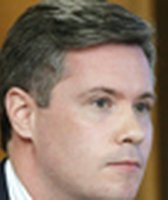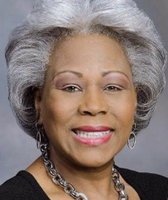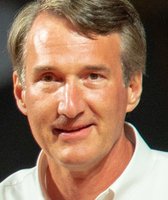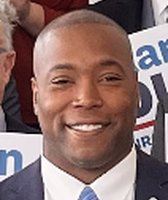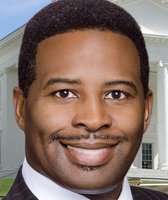Get PolitiFact in your inbox.

Gov. Bob McDonnell, shown here at his Janaury 2010 inauguration, made 48 campaign promises that we've been tracking.
Gov. Bob McDonnell will leave office on Jan. 11 having fulfilled about half of promises he made during his 2009 campaign.
That’s the finding of PolitiFact Virginia’s Bob-O-Meter, which has tracked the progress of 48 pledges McDonnell made when he sought office. The report card, as it now stands, shows McDonnell with 24 "Promises Kept."
Flash back to 2009 and you’ll find voters outraged by then-Gov. Tim Kaine’s decision to close 19 of the state’s 42 interstate rest stops to save money during the Great Recession. McDonnell made headlines by promising to reopen all the bathrooms and the next year, on the 89th day of his governorship, he delivered,
Although no other promise kept by McDonnell produced the same gut-felt relief, the governor fulfilled a number of pledges to crack down on sex offenders, repeat drug dealers, gang recruiters and identity thieves. True to his word, he took steps to expand education is science and math.
Not everything is politics is black and white. McDonnell wound up compromising on 11 promises either by changing his approach to problems, putting little energy in pursuing results or seeking accord with the General Assembly.
McDonnell broke 11 promises. Four of them involved healthcare: Providing aid to rural medical schools, incentives to attract doctors and nurses to practice in low-population regions, more money to free clinics, and tax breaks for buying long-term health insurance.
We should also note that the governor, who spent the last year of his term mired in a scandal over his and his family’s acceptance of more than $160,000 in gifts and loans from businessman Jonnie Williams, broke a promise to establish an ethics commission empowered to investigate legislators.
Two of McDonnell’s pledges are rated "In the Works" because of insufficient data to fully assess the governor’s progress. We’re going to take a new look at one of them this week -- a promise to put the state on a path of dramatically increasing the number of college degrees awarded through 2025.
Our monitoring of campaign promises won’t end when McDonnell leaves office. In the coming weeks we’ll be introducing a new meter that will keep tabs of the pledges made by Gov.-elect Terry McAuliffe.
Here’s a synopsis of each of McDonnell’s promises. For more details, visit click on the Bob-O-Meter on the right-hand side of this page or click on the hyperlinks.
Promises Kept
Establish a health sciences high school: In 2012, legislators approved McDonnell’s request to set aside $80,000 in grants to help localities start health sciences academies that prepare students to become doctors, nurses, pharmacists and other health care professionals. This year, the state Board of Education approved plans to establish eight new health sciences academies across Virginia, each started with a $10,000 state grant.
Provide incentives for electronic medical records: Through funding provided by the 2009 federal stimulus, McDonnell offered incentives to medical practices to store electronic records. Total payments to a practice can add up to $63,750 though 2021. Virginia is eligible for the federal money because it made required investments to develop a computer network for medical records.
Audit the Department of Medical Assistance Services: A February 2012 audit conducted by CGI Technologies and Solutions and KPMG looked at the findings of every review of DMAS over the last five years and what steps the agency took to correct problems. In general, that report found that the agency, which oversees the state’s Medicaid program, does a good job of addressing issues raised.
Increase resources to fight Medicaid fraud: McDonnell pledged to beef up Virginia’s Medicaid Fraud Unit in the attorney general’s office. During his term, he worked with Attorney General Ken Cuccinelli to expand the unit from 52 workers to about 83. The federal government pays 75 percent of the unit's cost and the state puts up the rest.
Reduce stillbirths, low birth weights and improve child health care: In mid 2009, six months before McDonnell entered office, 75.1 percent of pregnant women on Medicaid received prenatal care during their first trimester. That had risen to 78.3 percent, according to figures available earlier this year. The rate of stillbirths and low birth weights in Virginia for Medicaid recipients also declined.
Expand the Rainy Day Fund: With McDonnell’s endorsement in 2010, voters allowed the maximum size of the emergency fund to be increased from $1.4 billion to about $2.1 billion. The two-year process to put the state constitutional amendment on ballots began before McDonnell became governor. The fund, which was heavily drained during the Great Recession, is expected to reach $688 million when the budget year ends on July 1.
Establish an inspector general: McDonnell signed legislation in 2011 creating a central inspector general's office to investigate malfeasance in any agency that's "wholly or principally supported by state funds." In June 2012, he appointed former FBI special agent Michael F.A. Morehart as the state inspector general.
Establish a tax credit for green jobs: The General Assembly passed legislation in 2010 that established an annual state tax credit of $500 for every green job created, up to 350 jobs per company. The credit is available through the end of this budget year, which ends July 1, 2014.
Expand monitoring of sexual predators: Several steps have been taken to protect the public against such felons: longer prison sentences; expansion of the civil commitment program, which institutionalizes chronic sex offenders after they’ve served prison terms; and the hiring of additional probation and compliance officers.
Seek tougher sentences for repeat drug dealers: In 2012, the General Assembly passed legislation requiring minimum prison sentences of three years for second-time drug dealers and 10 years for third-time dealers. Before, there was no mandatory minimum sentence for second-time offenders and third-time offenders faced at least five years in prison.
Seek an increase in crime conviction fees: In approving a biennial budget in 2010, the General Assembly increased the mandatory fee for conviction of misdemeanor from $5 to $15, and the fee for a felony conviction from $15 to $40. The increased fees, still in effect, generate about $630,000 a year in new revenues.
Seek adult trials for violent youths: True to his exact pledge, McDonnell endorsed legislation in 2010 that would have allowed youths 14 or older to be tried as adults for repeat offenses involving violence, drug dealing or gang activities. The measure was defeated in the House. In 2012, the General Assembly approved and McDonnell signed a watered-down bill that made 14-year-olds eligible for adult trial for third offenses for drug dealing.
Seek tougher penalties for crimes against elderly: McDonnell backed a number of bills that increased penalties for financial crimes committed against senior citizens, but none of them passed the General Assembly. Lawmakers have been unable to establish a clear legal line between when a senior is bilked and when that person makes a competent decision that may not be in his financial interest.
Seek tougher identity theft laws: McDonnell signed a bill this year that increased the maximum penalty for committing identity theft of five or more people from five years in prison to ten years.
Consolidate asset forfeiture laws: In 2012 McDonnell signed a bill that streamlined the state’s various provisions for handling assets seized from criminals. The governor was a year late in meeting his self-imposed deadline to seek the new forfeiture law. But in the end, he delivered.
Seek law establishing "gang-free zones": In 2010, McDonnell signed legislation expanding gang-free zones -- which already existed around schools -- to the buildings and grounds of any publicly owned or operated community center or recreation center. The governor sought a bill that would have included public parks, libraries and hospitals. Efforts to add those facilities to the law failed in 2012 and 2013.
Seek tougher penalties for gang recruitment: The governor backed unsuccessful legislation that would have made it a Class 5 felony -- punishable by up to 10 years in prison -- for recruiting as gang member "by telephone or any electronically transmitted communication." As with many of his campaign vows, McDonnell only pledged to have a bill introduced; he never promised the General Assembly would pass it.
Double the number of Governor’s Career and Technical Academies: McDonnell pledged to expand STEM academies -- local initiatives in which school divisions and colleges partner to provide curriculum that prepares students for jobs in science, technology, engineering and math. When he became governor, there were eight such institutions. In October 2012, the Board of Education approved the 16th academy.
Consolidate workforce training programs: As a candidate, McDonnell griped that the state had 23 different workforce training program run by nine agencies. As governor, he put all of the programs under one person in a newly created job: the director of education and workforce development. Elizabeth Creamer, a veteran administrator in the community college system, was appointed to the post.
Propose new methods for establishing charter schools: In 2010, McDonnell backed legislation that would have empowered the state Department of Education to overturn a local school board’s rejection of an application to open a charter school. The General Assembly wound up passing -- and McDonnell signed -- a watered-down bill that kept the decision solely with local school boards, but set up a system for contesting the grounds for a rejecting an application.
Issue transportation bonds: During his campaign, McDonnell complained that the state had not issued $3 billion in transportation bonds that the General Assembly authorized in 2007. McDonnell began selling the bonds in early 2010, noting that interest rates were low and transportation needs were high.
Propose legislation to privatize liquor sales: Seeking to raise money for transportation, McDonnell offered plans in 2010 to sell off the state’s wholesale and retail control of liquor sales and, in 2011, to privatize liquor stores. Both efforts drew strong opposition from the business community and legislators and were not brought up for vote. It should be noted that McDonnell changed course this year and pushed through a series of tax and fee increases that will raised $880 million year for transportation.
Raise speed limit to 70 mph: Less than three weeks after McDonnell’s inauguration, legislators approved his plan to raise the speed limit on stretches of rural interstates. The state easily met the governor’s deadline to post 70 mph zones covering 61 percent of Virginia's interstates before the end of 2010.
Open shuttered highway rest stops: The state closed 19 of the 42 rest stops on interstates in 2009 amid a budget crunch. McDonnell pledged that, if elected, all of them would be open by the 90th day of his administration. He met that promised on April 14, 2010 -- one day ahead of schedule.
Compromises
Fund programs based on effectiveness: McDonnell followed through on the plans of previous administrations to create a website where politicians, state employees and the public can scrutinize state agencies’ performance goals and funding. But this tool, while helpful to budget writers, has not led to a new appropriations process that, in McDonnell's promise, "rewards effective programs and allocates future spending based upon that effectiveness."
Expand lobbyist disclosure: McDonnell endorsed a House bill in 2010 that would require lobbyists to list which bills they’re promoting, but he was silent on a stronger Senate bill that added state procurement transactions to lobbyist disclosures. Both bills died during the 2010 session and he has not pushed for expanded disclosure since.
Ensure citizen input in redistricting: The governor named an 11-member bipartisan citizens’ commission on redistricting in January 2011. The panel drew maps that largely ignored political considerations and tried to keep districts compact and composed of entire communities. But legislators and McDonnell shunned the commission’s recommendations, leaving the drawing of districts solely in the discretion of politicians.
Start a performance pay program: McDonnell’s campaign promise was targeted at state managers, but the program he offered as governor included all state employees. His program, which has been in effect for several years, gives a 3 percent bonus in December to employees that receive at least satisfactory evaluations in agencies that attain their cost-savings goals. McDonnell, who served under tight economic conditions, did not recommend across-the-board, permanent raises based on merit.
Ban gifts during procurement process: The governor promised to ban political gifts to the executive branch from companies and individuals bidding on state contracts over "a certain amount." In 2010, McDonnell signed a lenient bill banning acceptance of gifts greater than $50 from parties bidding on contracts worth $5 million or more. Contrary to his promise, the law exempted two executive branch members -- the lieutenant governor and attorney general.
Implement new drug education program: McDonnell pledged to install a standard program for schools to teach "how drugs can can negatively impact physical and mental health, as well as the social consequences of substance abuse that reach children at a variety of ages." Once in office, he decided to leave school systems in charge of their anti-drug curricula and announced an initiative to recognize the best programs.
Increase funding for Virginia Teaching Scholarship Program: McDonnell made this promise with an eye towards encouraging college students to become teachers in STEM subjects -- science, technology, engineering and math -- through additional funding of the scholarship program. During McDonnell’s term, overall funding for the program did not increase, but the maximum annual scholarship a student could receive was raised from $3,720 to $10,000 and more priority was placed giving the rewards to students with top grades.
Appoint a public school turnaround leader: The governor moved away from this pledge, saying he was satisfied with the work of the pre-existing Department of Education’s Office of School Improvement. The agency, in 2010, selected three educational services companies and Johns Hopkins University to help failing schools improve. And the General Assembly approved McDonnell’s plan to allow the state to take over a handful of schools that are failing accreditation standards, although the program is being challenged in court. Bottom line: McDonnell addressed failing schools, but not quite in the manner he promised.
Consolidate guides for business creation and expansion: McDonnell dropped his pledge to consolidate four different state manuals for starting and expanding businesses into one publication. Instead, he focused on improving the state’s Business One Stop website which, the administration says, soon will allow entrepreneurs to electronically submit all necessary forms to start or grow a business in Virginia.
Dedicate 75 percent of surpluses to transportation: State law requires 67 percent of net budget surpluses -- after variety of deposits are made -- go to the Transportation Trust Fund. Twice during McDonnell’s term, the Senate rejected bills that would have increased the share to 75 percent. As a result, McDonnell was never able to dedicate the promised three-quarter share to roads.
Seek telecommuter tax credit: McDonnell supported and signed a bill for a telecommuter tax credit, but it fell far below his promise of equaling 100 percent of the set-up costs to enable an employer to work at home. The state allocated a total of $1 million a year to the program, not enough to handle demand. As a result, the tax credits have been prorated among requesting companies.
Promises Broken
Increase tax credit for long-term health insurance: McDonnell supported 2011 legislation that would have doubled a credit on state income taxes to offset the premium payments for long-term health insurance. Although lawmakers passed the bill, they never funded the increased tax break, so it did not take effect. This year, McDonnell signed a bill repealing the credit after the Joint Legislative Audit and Review Commission concluded the tax break was not encouraging Virginians to buy long-term health insurance.
Expand incentives for rural health care professionals: McDonnell did not attempt to expand loan forgiveness and scholarship programs in the state, as he promised.
Train more doctors to practice in rural areas: McDonnell pledged to offer state assistance to help two private medical schools -- The Edward Via College of Osteopathic Medicine in Blacksburg and the Virginia Tech Carilion School of Medicine in Roanoke -- train doctors and nurses to practice in rural Virginia. But the money never came because, the administration said, medical schools were expanding in rural areas without state assistance.
More money to free clinics and community health care centers: Funding for these safety net healthcare providers has remained at $9.6 million a year during McDonnell’s term. Contrary to his promise, McDonnell twice recommended cutting the appropriation, but the General Assembly nixed his requests.
Eliminate budget gimmicks: Combating massive revenue shortfalls in 2010, McDonnell and the legislature balanced the budget by withholding a scheduled $620 million state pension contribution and using the money to pay for other programs.
Establish ethics commission: Because McDonnell was successful in establishing an inspector general’s office in 2012, he decided the commission was no longer necessary. During the campaign, he promised to set up both entities. The inspector, it should be noted, is not empowered to investigate legislators. Virginia is one of 10 states that lacks a commission to ensure ethics statutes are followed by elected officials.
Seek video streaming of meetings: McDonnell abandoned his pledge to seek legislation that would mandate video streaming the meetings of all "major executive branch boards and commissions." The administration has made the technology available, but has left final decisions on whether to broadcast meetings with the individual panels.
Increase penalty for sexual battery of children: No bill was introduced to fulfill McDonnell’s pledge to raise the punishment for sexual battery -- touching a victim by force, ruse or intimidation -- from a class 1 misdemeanor punishable up to a year in jail to a class 6 felony with a maximum term of five years in prison. A spokeswoman said the governor was discouraged by an estimated $5.1 million cost over six years to enforce such a law and focused on other priorities against sex crimes.
Put tolls on North Carolina border: McDonnell’s pledge to toll I-85 and I-95 turned out impossible to keep because federal regulations allow states to toll only one interstate. The governor’s effort to toll just I-95 was stymied by the General Assembly. This year, McDonnell changed his approach to raising transportation revenues and won passage of major tax increases.
Conserve 400,000 acres: Through September 2013, 164,433 acres were preserved under McDonnell with another 47,630 acres possible before the end of his term. The tight economy made Virginia’s Land Preservation Tax Credit less attractive to landowners.
Promote health savings accounts: HSAs are used by many insured people to help pay for out- of-pocket medical expenses. Administration officials say McDonnell did not fulfill his pledge to "publish a list of all insurers" that offers HSAs because of uncertainty about how the untaxed accounts would fit in with Obamacare mandates.
In the Works
Increase classroom share of education spending: McDonnell promised to increase spending for classroom instruction by 4 percentage points, using data collected by the U.S. Census Bureau as the gauge. The federal figures show Virginia spent 60.7 percent of its public education funds in the classroom during fiscal 2010, when McDonnell took office, and 60.3 percent during the next budget year. Those are the two most current years that the statistics are available, so it cannot be determined whether the governor met his pledge.
Award 100,000 additional degrees: In 2011, the governor won passage of initiatives to increase college enrollment, improve graduation rates and make more financial aid available to middle- and low-income students. In the 2010-11 school year, Virginia awarded 42,825 bachelor and associate degrees through public institutions. If the number of graduates increases by average of 2.6 percent annually, the number of extra graduates each year will cumulatively add to 100,000 by 2024-25. McDonnell pledged to put Virginia en route to meeting that goal. Data available at the end of 2012 was inconclusive on whether Virginia was on course. We’re taking a new look at this promise based on updated enrollment projections and will report our findings in early January.
Our Sources
See hyperlinks.



